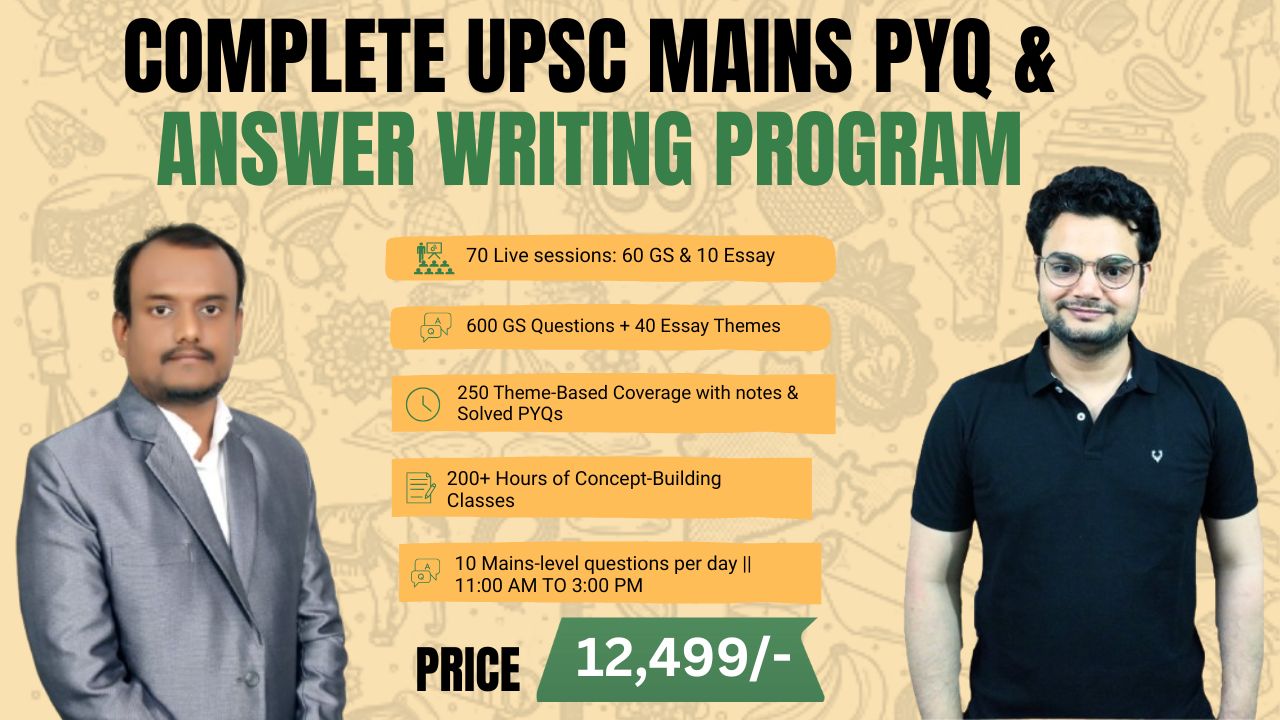- Overview
- Course Details
- Curriculum
Program Overview
Course Coverage: Recorded
- Theme-Based Coverage: The entire Mains GS syllabus broken down into 250+ microthemes, each linked to UPSC Previous Years Questions and contemporary relevance.
- 200+ Hours of Concept-Building Classes: Focused on note-making and answer-writing, strictly based on past year questions and their related syllabus sections.
Practice Sessions: Live on Application/Web
- Total Sessions: 70
- Content per Session: 10 Mains-level questions per day
- Timings: 11 AM to 3 PM.
- Essay Sessions: 4 Essay Topics brainstormed + discussion per group session
- Focus: Practice, Evaluation, Feedback, Structuring, Essay Brainstorming, and Value-Addition
Course Structure:
Component | Number of Sessions | Description |
GS Answer Writing | 60 | Subject-wise sessions across GS1–GS4 with 10 Qs per day (600 total) |
Essay & Group Discussions | 10 | 4 Essay topic brainstorming + group peer reviews, model outline building |
Total Questions Covered | 600 GS Questions + 40 Essay Themes | Comprehensive syllabus coverage |
🖊️ Daily Live Writing Format
- Live Duration: ~3.5 Hours per Session
- 10 Questions / Day (GS topics), Students write live on paper.
- Mentor Intervention.
- Mentor-led discussion on structure, content, keywords etc.
- Top copy showcase
- Mistake debrief + model answer snippets
📝 Essay & Group Discussion Format:
- 4 UPSC-standard topics per session:
- 2 Philosophical / Abstract
- 2 Socio-political / Current-based
- Group brainstorming (theme, structure, examples)
- Mentor-led model framework building
- Peer draft comparison + feedback
📚 Material Provided (Included in Course)
(1) Comprehensive PYQ Notes (11 Years)
- Micro-theme wise analysis of each GS paper (2013–2024)
- Detailed yet succinct Notes of each Microthemes.
- Mapped model answers and approach strategies
- Trend analysis to predict likely areas
(2) Short 1-Pager Notes for Quick Revision
Each 1-pager includes:
- Best definitions and one-line intro
- Key data, facts, schemes, and recent examples
- Common issues & challenges
- Government interventions & reforms
- Use-in-any-answer phrases
- Suggested best intros & conclusions
Format perfect for last-mile revision before Mains
(3) Thematic Support Sheets
Provided as separate compilations:
- Fact Sheet – Budget, SDGs, rankings, policy targets
- Example Sheet – Real cases from India, judgments, best practices
- Intro & Conclusion Sheet – 100+ model opening and closing lines for reuse across answers
(4) Solutions of All 600 Questions (Live Written)
- Model solutions after each session
- Answer copies from toppers & top batch performers
- Mentor-evaluated versions with improvement tips
🎯 Key Outcomes
- Consistent answer writing habit across syllabus.
- Improved writing speed, structure, and quality.
- Deep familiarity with PYQ patterns and keyword use.
- Confident essay planning & framing.
- Ready-to-use data/examples bank.
- Access to 1500+ mentor-reviewed answers.
Demo Videos
Know Your Faculty

Dhananjay Gautam Sir
- Founder: Freedom UPSC
- UPSC: 2 interviews, 6 mains.
- YouTube: 30k+ subscribers.
- Mentorship: 10,000+ students.
- Ex-Sr. Mentor: Vision IAS, Vajiram
- Ex-Manager: SBI.
- Master’s: Electrical Engineering.
Frequently Asked Question
1. Does the course end once the syllabus is completed as per schedule?
The syllabus completion target is 31st March. Further support will be provided through Mentorship Sessions until the Mains exam to ensure comprehensive preparation and guidance.
2. How often are mentorship sessions held, and what is their focus?
Mentorship sessions occur three times a week—on Tuesdays, Thursdays, and Sundays. These interactive sessions aim to clarify doubts, strengthen core concepts, and provide insights into Prelims requirements.
3. What kind of content and resources are provided in the program?
- Combined Preparation notes.
- Mains focussed Notes PYQ inspired.
- Short notes for quick revision 2 months before exam.
4. Is the Mains test series included in this program?
No, the Mains test series is not included in this program. This program focuses on syllabus completion through PYQs. Answer writing skills to be promoted through practice of PYQs. Test series will be introduced after prelims in a separate course.
5. Are live classes and group sessions the same?
No, live classes and group sessions are different. Live classes provide structured, chapter-wise coverage of critical topics to build comprehensive subject knowledge. Group sessions, held three times a week, focus on clearing doubts, providing motivation, and offering additional guidance to keep you on track and engaged throughout your preparation.
6. Will recordings be provided for the classes and group sessions?
Yes, while it is strongly recommended to attend live classes and group sessions to stay accountable and maintain momentum, recordings are available to ensure students can review and prepare at their own pace. This flexibility allows you to revisit important concepts and catch up whenever needed.
7. Where can we access the course?
You can access the course on mobile, laptop, desktop, and tablet. We offer an Android app, iOS app, Windows application, and web access through our login portal. This ensures seamless learning anytime, anywhere.



